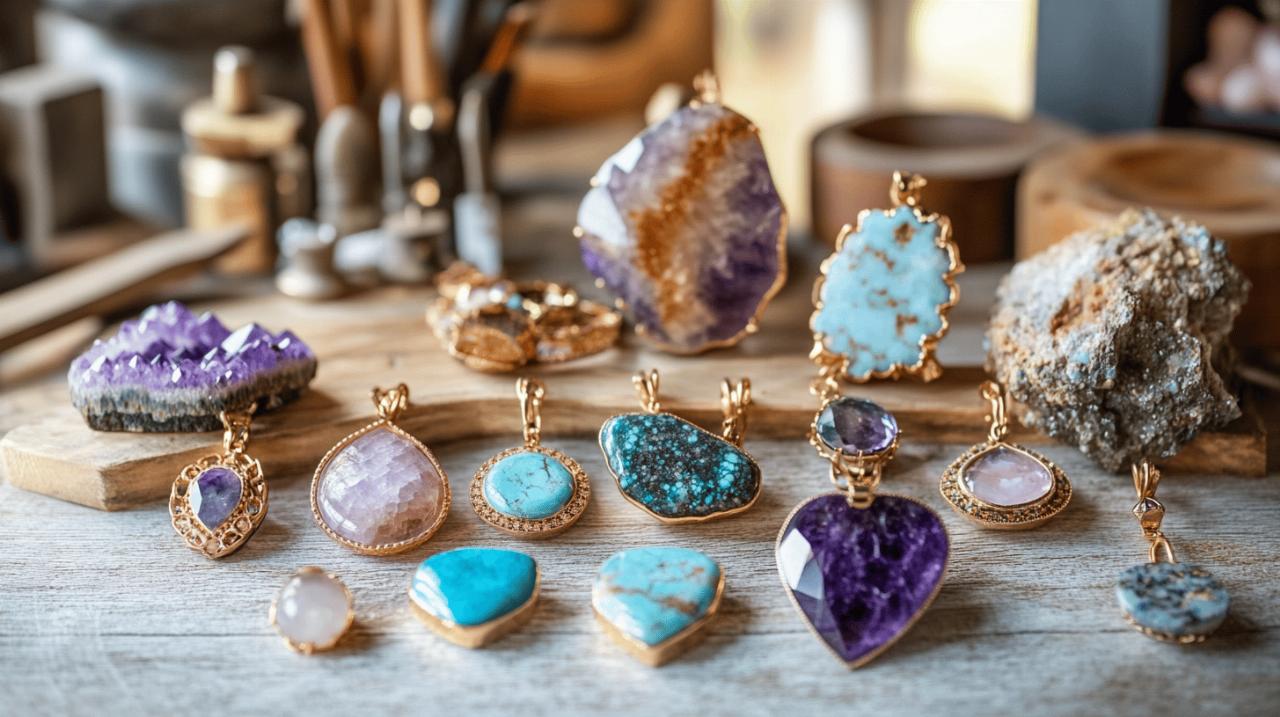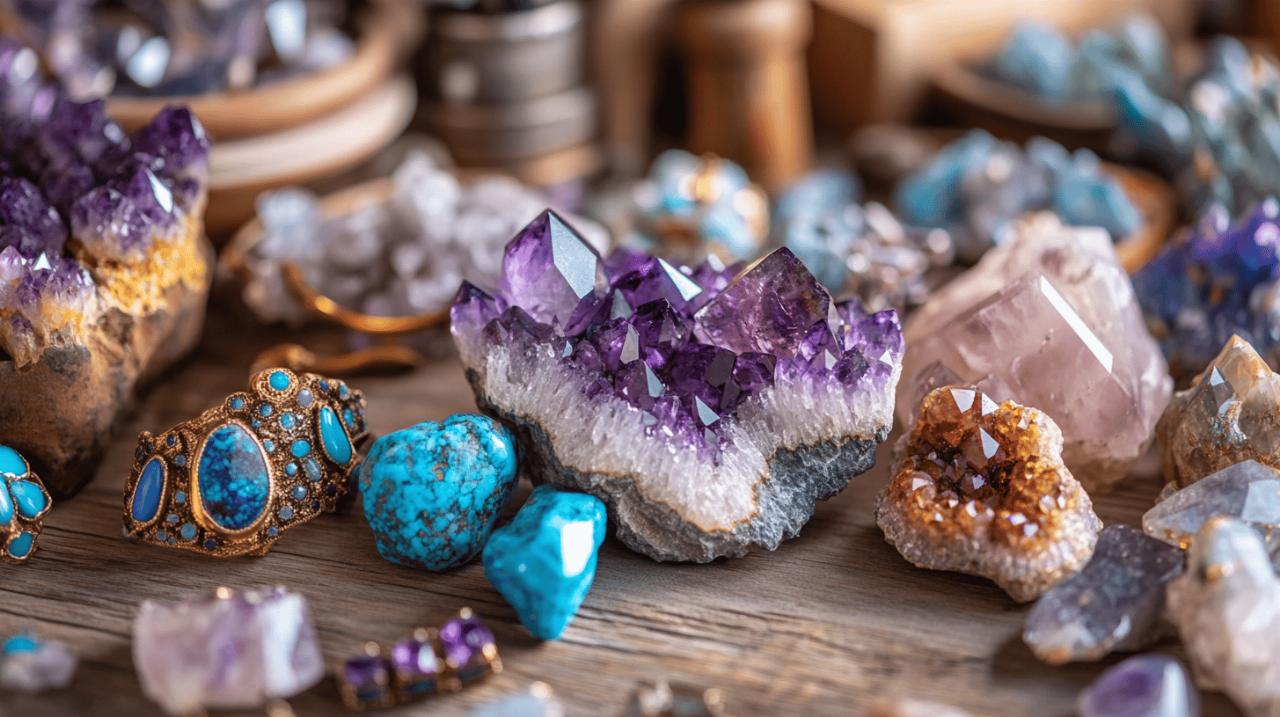The natural stone jewellery wholesale business presents both exciting opportunities and unique challenges in today's market. As consumer preferences evolve towards more meaningful and distinctive accessories, wholesalers of natural stone jewellery must adapt their strategies to remain competitive and relevant. This article explores key aspects of succeeding as a 'grossiste de bijoux en pierres naturelles' in an increasingly complex marketplace.
Understanding the natural stone jewellery market
The natural stone jewellery sector has experienced remarkable growth in recent years, driven by consumers seeking items that carry both aesthetic appeal and deeper significance. To thrive in this environment, wholesalers need comprehensive knowledge of both product attributes and shifting market demands.
Current consumer trends and preferences
Today's jewellery buyers are increasingly sophisticated in their tastes and expectations. They gravitate toward pieces with character and history, moving away from mass-produced items toward those featuring unique stones with distinctive patterns or properties. Wholesalers who recognise this shift can position themselves advantageously by curating collections that emphasise individuality and craftsmanship rather than uniformity.
The market shows strong interest in specific stones based on their purported metaphysical properties or wellness benefits. For example, amethyst for stress relief, rose quartz for emotional healing, and black tourmaline for protection are particularly sought-after by consumers who value these additional dimensions. Forward-thinking wholesalers track these trends closely to anticipate demand and adjust their inventory accordingly.
The Rising Demand for Ethical and Unique Pieces
Ethical sourcing has become a significant factor influencing purchasing decisions. Consumers increasingly want to know the origin story behind their jewellery, with many willing to pay premium prices for pieces they can confidently wear without ethical concerns. This shift creates an opportunity for wholesalers to differentiate themselves by offering transparently sourced products with verifiable origins.
Alongside ethical considerations, authenticity drives market interest. Buyers seek genuine stones with minimal treatment, preferring natural variations over artificially enhanced perfection. Successful wholesalers emphasise these authentic qualities, educating their retail clients about the natural characteristics that make each stone special rather than positioning inconsistencies as flaws.
Sourcing and supplier relationships
The foundation of any successful natural stone jewellery wholesale business lies in its sourcing practices and supplier relationships. These connections determine not only product quality but also business reputation and long-term viability.
Establishing ethical supply chains
Creating transparent supply chains requires deliberate effort but yields substantial benefits. Wholesalers who can verify their stones' journey from mine to market gain credibility with increasingly conscious retailers. This involves developing relationships with miners and cutters who follow responsible practices, potentially visiting mining sites personally where feasible, and maintaining detailed documentation of stone origins.
Fair trade principles increasingly influence the natural stone market. Leading wholesalers ensure fair compensation throughout their supply chain, recognising that ethical business practices contribute to sustainability while also providing compelling selling points for retailers. These relationships, once established, become valuable business assets that competitors cannot easily replicate.
Evaluating craftsmanship and stone quality
Expert assessment skills are essential for wholesalers to ensure consistent quality. This includes recognising natural formations versus treatments, identifying potential durability issues, and understanding how different cutting and polishing techniques affect a stone's final appearance. Developing this expertise takes time but becomes a crucial competitive advantage.
Quality control systems protect both wholesaler reputation and retailer relationships. Standardised evaluation processes, regular supplier assessments, and willingness to reject substandard shipments demonstrate commitment to excellence. Wholesalers who maintain rigorous standards build trust with retailers who depend on consistent quality to satisfy their own customers.
Staying current with industry developments
The natural stone jewellery landscape continues to evolve rapidly. Wholesalers who thrive remain deeply connected to industry movements and respond nimbly to emerging opportunities.
The Value of Trade Shows and Networking
Industry events provide invaluable insights difficult to gather through other means. By attending major jewellery and gemstone exhibitions, wholesalers gain early exposure to emerging trends, make connections with potential suppliers, and understand competitive positioning. These events also offer opportunities to showcase unique offerings to potential retail clients.
Professional networks extend beyond formal events to include ongoing relationships with industry peers, membership in trade organisations, and participation in educational forums. These connections provide early warnings about market shifts, supply chain disruptions, or regulatory changes that might affect business operations.
Adapting your inventory to market shifts
Successful wholesalers balance trend responsiveness with collection cohesiveness. While flexibility allows capitalisation on emerging opportunities, maintaining a recognisable aesthetic or specialisation helps retailers understand what makes a particular wholesaler distinct from competitors.
Inventory management becomes increasingly sophisticated as wholesalers grow. Advanced systems tracking sales velocity, seasonal patterns, and complementary pairings help optimise purchasing decisions and prevent both stockouts of popular items and excess inventory in declining categories.
Excellence in wholesale customer service
Superior customer service transforms transactional relationships into enduring partnerships, creating stability for wholesale businesses in competitive markets.
Meeting retailer needs and expectations
Retailers face their own set of challenges in presenting natural stone jewellery effectively. Wholesalers who provide educational materials, display recommendations, and stone identification guides help their clients succeed, ultimately driving more consistent orders. This support might include training sessions for retail staff, custom presentation materials, or certification documentation.
Flexible ordering options accommodate diverse retail clients. Some may need just-in-time inventory replenishment, while others prefer seasonal bulk purchases. Offering varied minimum order quantities, reorder capabilities, and mixed selection options allows wholesalers to serve different types of retailers effectively.
Building long-term business partnerships
Communication consistency builds trust with retail accounts. Regular updates about new collections, advance notice of supply challenges, and transparency about pricing changes demonstrate professionalism and consideration. These practices help retailers plan effectively while reinforcing the wholesaler's reliability.
Loyalty programmes reward ongoing relationships, encouraging retailers to concentrate their purchasing rather than spreading orders across multiple wholesalers. These might include preferential access to limited stones, volume discounts, or exclusive designs. Such programmes acknowledge the value of established relationships while incentivising increased order values.
Digital strategies for natural stone jewellery wholesalers
The natural stone jewellery market is booming as more consumers seek unique, ethically sourced pieces with character and meaning. For wholesalers looking to thrive in this dynamic landscape, embracing digital transformation isn't just beneficial—it's essential. Savvy wholesalers are now complementing traditional business practices with innovative online approaches to stay competitive and meet changing buyer expectations.
Leveraging e-commerce platforms and online marketplaces
Gone are the days when wholesale transactions happened exclusively through in-person meetings and paper catalogues. Today's successful grossistes de bijoux en pierres naturelles are establishing robust presences across various digital channels. Dedicated wholesale platforms like Faire and Ankorstore offer specialised environments where you can showcase your natural stone collections to vetted retailers. Meanwhile, B2B marketplaces provide additional exposure to potential business customers seeking authentic, quality stone pieces.
Smart wholesalers are implementing tiered pricing structures and minimum order quantities within these platforms, whilst offering exclusive digital promotions to incentivise bulk purchases. Many are also utilising data analytics tools integrated with these platforms to track which stone varieties, designs, and price points generate the most interest from retailers. This market intelligence allows for more strategic inventory management and helps in identifying emerging trends before competitors.
Creating compelling digital catalogues and virtual showrooms
The tactile nature of stone jewellery presents unique challenges in digital presentation, but innovative wholesalers are turning this challenge into opportunity. High-resolution photography that captures the distinctive patterns, colours, and textures of each stone type has become non-negotiable. Leading wholesalers are going further by implementing 360-degree product views and close-up capabilities that allow retailers to examine the unique characteristics of each piece virtually.
Virtual showrooms represent the next evolution in digital wholesale presentation. These interactive environments enable retailers to browse collections by stone type, design style, or price point, replicating the discovery experience of physical showrooms. Some forward-thinking wholesalers are even incorporating augmented reality features that allow retailers to visualise how pieces might look when displayed in their shops. These immersive digital experiences build confidence in purchasing decisions and reduce the hesitation that might otherwise accompany remote wholesale transactions in the natural stone sector.




